Henry Cloud's Blog, page 9
January 7, 2019
How to Guarantee that People Will Want to Be Close to You
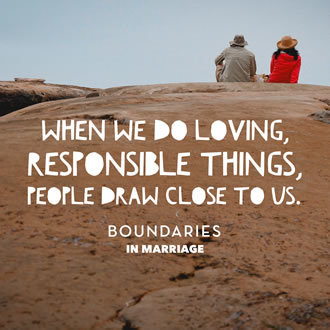 Amy and Randall had been married for eight years, and they loved each other. However, when he was angry or upset, Randall became moody and would withdraw from Amy and the kids, except for occasional outbursts of anger. When his manufacturing business was struggling, he would sit silently through dinner. Once, during this period, the children were arguing at the dinner table. Out of the blue, Randall said, “Amy, can’t you keep these children in line? I can’t even have a moment’s peace in my own home!” And with that, he stormed out of the kitchen into his home office, turned on the computer, and stayed there until the kids went to bed.
Amy and Randall had been married for eight years, and they loved each other. However, when he was angry or upset, Randall became moody and would withdraw from Amy and the kids, except for occasional outbursts of anger. When his manufacturing business was struggling, he would sit silently through dinner. Once, during this period, the children were arguing at the dinner table. Out of the blue, Randall said, “Amy, can’t you keep these children in line? I can’t even have a moment’s peace in my own home!” And with that, he stormed out of the kitchen into his home office, turned on the computer, and stayed there until the kids went to bed.
Amy was hurt and confused. But she had a pattern of “handling” Randall’s moods. She would try to cheer him up by being positive, encouraging, and compliant. “He has a hard job,” Amy would think. “Nurturance is what he needs.” And for the next few hours, and sometimes days, she would center the family’s existence around Dad’s mood. Everyone would walk on eggshells around him. No one was to complain or be negative about any subject, for fear of setting him off again. And Amy would constantly try to draw him out, affirm him, and make him happy. All her emotional energy went into helping Randall feel better.
Amy and Randall’s struggle illustrates the importance of the first law of boundaries: “The Law of Sowing and Reaping.” Simply put, this principle means that our actions have consequences. When we do loving, responsible things, people draw close to us. When we are unloving or irresponsible, people withdraw from us by emotionally shutting down, or avoiding us, or eventually leaving the relationship.
In their marriage, Randall was sowing anger, selfishness, and withdrawal of love. These hurt Amy’s feelings and disrupted the family. Yet Randall was not paying any consequences for what he was sowing. He could have his tantrum, get over it, and go about his business as if nothing had happened. Amy, however, had a problem. She was bearing the entire burden of his moodiness. She stopped what she was doing to take on the project of changing her moody husband into a happy man. Randall was “playing,” and Amy was “paying.” And because of this, he was not changing his ways. Randall had no incentive to change, as Amy, not he, was dealing with his problem.
What consequence should Randall have been experiencing? Amy could have said to him, “Honey, I know you’re under stress, and I want to support any way I can. But your withdrawal and rage hurt me and the children. They are unacceptable. I want you to talk more respectfully to us when you’re in a bad mood. The next time you yell at us like that, we’ll need some emotional distance from you for a while. We may leave the house and go to a movie or see some friends.” Then Randall would have to deal with the result of his actions: loneliness and isolation.
When you sow mistreatment of people, you should reap people’s not wanting to be around you. It is to be hoped that the pain of this loneliness would help Randall take steps to deal with his feelings. Sowing and reaping has to do with how spouses affect and impact each other’s heart. Amy and Randall had a problem in relational sowing and reaping. He was being hurtful and difficult, yet Amy took the consequences of his behavior for him.
In their relationship, the one who has the problem isn’t facing the effects of the problem. And things don’t change in a marriage until the spouse who is taking responsibility for a problem that is not hers decides to say or do something about it. This can range from mentioning how her spouse’s behavior hurts her feelings, all the way to setting a limit on the behavior. This helps place both the sowing and the reaping with the same person and begins to solve the boundary violation.
________
Whether you’re a newlywed or married for many years, learn how Boundaries in Marriage will help you build a foundation for your relationship to flourish. Learn More
The post How to Guarantee that People Will Want to Be Close to You appeared first on Boundaries Books.
December 17, 2018
The Best Boundary that You Can Have in Your Dating Life
 Romance is great. Sexuality is great. Attraction is great. But here is the key: If all of those are not built upon lasting friendship and respect for the person’s character, something is wrong.
Romance is great. Sexuality is great. Attraction is great. But here is the key: If all of those are not built upon lasting friendship and respect for the person’s character, something is wrong.
A real and lasting relationship must be built upon friendship first. You are going to spend a lot of time with that person. As one friend of mine said about picking her mate: “He was someone I knew I could grow old with. I liked spending time with him. And he made me laugh.” She also shared deep spiritual values and other commonalties with him as well, as she would with any other friend. They have been married for nearly thirty years.
The best boundary that you can have in your dating life is to begin every relationship with an eye toward friendship. Do not rush into any kind of romance. Keep your boundaries, physically, emotionally, and otherwise. But, how do you do this?
Spend time getting to know someone in nonromantic ways. For example:
Spend time with that person in groups of other friends.
How well does he or she fit in? How well do you fit in with his or her friends?
Does he or she even have friends?
(If they do not have long-term friendships, that is a bad sign.)
If you do not allow yourself to rush into falling for someone that you have not become friends with first, you will be more sure when you let yourself go to the next step. Certainly you might find yourself having all sorts of feelings. Enjoy them. But do not believe them. Only believe your experience of getting to know a person and seeing if you can share at a deep level.
________
Click to Tweet: The best boundary that you can have in your dating life is to begin every relationship with an eye toward friendship.
________
See if you find that he or she is a person of the kind of character you would trust as a friend. And as important as all of that, see if that person is a person that you would like spending time with if there were no romance at all. That is the one true measure of a friend, a person with whom you like to spend time, having no regard to how you are spending it. “Hanging out” is fulfilling in and of itself. And that, long-term, requires character, and in the deepest of friendships, shared values as well. You would want your best friends to be honest, faithful, deep, spiritual, responsible, connecting, growing, loving, and the like. Make sure that those qualities are also present in the person you are falling in love with.
Keep your boundaries. We guarantee that being lovers with someone you would not want to be friends with is no good thing at all.
________
Get more helpful advice to build the best dating relationship and find the love of your life in Boundaries in Dating by Dr. John Townsend and Dr. Henry Cloud.
 Get The 10 Laws of Boundaries eBook when you subscribe to the Boundaries Weekly email newsletter. Learn More
Get The 10 Laws of Boundaries eBook when you subscribe to the Boundaries Weekly email newsletter. Learn More
The post The Best Boundary that You Can Have in Your Dating Life appeared first on Boundaries Books.
December 12, 2018
How to Regain Positive Momentum in the Midst of Negative Circumstances
 I (Dr. Cloud) was addressing an organization in the aftermath of a financial meltdown. We discussed why so many people were feeling down, defeated, and unable to perform at the levels they were used to. (It is amazing how just knowing that there is a reason for why you feel the way you do can be helpful. I wanted them to know that they weren’t crazy.) But then, I heard the words that I never want to hear.
I (Dr. Cloud) was addressing an organization in the aftermath of a financial meltdown. We discussed why so many people were feeling down, defeated, and unable to perform at the levels they were used to. (It is amazing how just knowing that there is a reason for why you feel the way you do can be helpful. I wanted them to know that they weren’t crazy.) But then, I heard the words that I never want to hear.
“So, what you are telling us is that we are basically screwed,” an attendee said. “We are just going to feel this way until the economy is different. This is just the new normal.”
“Yes, you are right,” I said. “This has become the new normal. And that is exactly your problem.”
“What do you mean?” she asked.
“Your creative drives, the energy that you summon to go out and win, have shut down,” I said. “You feel that since you can’t control the economy, you can’t control anything. And now that you have been feeling that way for a while, your brain has tricked you into thinking that that is the way it really is, that there is nothing you can do about it. And it has become, as you say, ‘normal’ to think that way.”
I went on to explain that the thing she was calling the “new normal” was a state inside her head. “It has become normal to you to feel that there is nothing you can do.”
“That is how I feel,” she said. “I just find myself not knowing what to do.”
“Exactly,” I said. “But if anyone knows what to do, it is probably you. You have been a leader at this company, and in this industry, for over a decade and a very high performer. If you can’t figure out something to do, who can?”
What I am about to tell you is going to sound so simplistic that you might miss the profound value that it has. But you have to just trust me that its effects can be incredible for your life.
First, take a piece of paper and draw a line down the middle of the page, creating two columns. In column number one, write down all of the things that you have no control over that are making your business difficult, such as the economy, the stock market, your customers’ finances, the banks, your boss, the parent company, the health care cost increase, the company’s overall budget, the board, the elections, the newscasts that hurt your business, etc. Those are the things that you have no control over that truly are affecting you. Get everything in that column that you can think of.
Next, I want you to really worry about these items, even as a group. Obsess over them. Ruminate. Dwell. Think it through over and over…FOR ABOUT FIVE OR TEN MINUTES. Then, I want you to set the list aside until the next day when you can do the same thing all over again. The reason I suggest that you do this is that you need to! You need to worry about this stuff, and get into “Ain’t it awful!” for a few minutes because it is! It is really bad stuff. I do not want you to be in denial. Besides, your brain needs to complete the loop of making sure that you know how bad it is. Otherwise, it will continue to remind you of it, probably in the middle of the night or every time you have some good idea. So, focus on it. But…only for about five or ten minutes.
________
Click to Tweet: Optimism is powerful. But, its resurrection cannot take hold until a sense of control is regained.
________
Next, after you have had your “worry time,” I want you to draw a circle around that time block and stop thinking about that column. Quarantine it. Put a boundary around it. If you find it helpful, put a red STOP sign on it. No more thinking about those things.
Next, and most important, let’s go to the second column. In this column, I want you to write down everything that you DO have control over that can drive results. This need not be a final list. You can always add more activities as they occur to you and your team, as they probably will change as time goes on. But once you have the list in the initial form, I want you to focus on it every single day. Make prioritizing and doing those activities the primary focus of every day. Work the list.
What makes this simple exercise so powerful is that it speaks directly to our brains’ executive functions and our desire to have control. The brain begins to “attend” to the actual activities that it can control, and it “inhibits” the thoughts, behaviors, and information that interfere with positive actions. The process of doing this, individually and collectively, builds up working memory and creates those positive, action-oriented behaviors that lead to better results, new products, new partnerships, new customers, and a lot more fun. The brain begins to get out of the mud.
Optimism is powerful. But, its resurrection cannot take hold until a sense of control is regained.
________
Is negative thinking overwhelming your ability to get results in your personal life, your organization, or your workplace? Discover why some people get results and others don’t in Boundaries for Leaders by Dr. Henry Cloud.
 Get The 10 Laws of Boundaries eBook when you subscribe to the Boundaries Weekly email newsletter. Learn More
Get The 10 Laws of Boundaries eBook when you subscribe to the Boundaries Weekly email newsletter. Learn More
The post How to Regain Positive Momentum in the Midst of Negative Circumstances appeared first on Boundaries Books.
December 10, 2018
The Truest Test of Trust
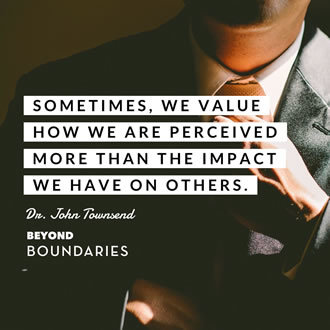 The extent to which other people are concerned about their impact on you is the extent to which you can trust them. You trust them because you know it’s not just you looking after yourself; they are looking after you too.
The extent to which other people are concerned about their impact on you is the extent to which you can trust them. You trust them because you know it’s not just you looking after yourself; they are looking after you too.
For example, I (Dr. Townsend) was working with Steve and Lisa on learning this, so that they could connect on a deeper level. She had a tendency to criticize him in public. It wasn’t mean or harsh. It was more like he was always the idiot in her stories: how he dented the car, got the flight info wrong, let their daughter wrap him around her finger, and so on. He brought it up in our session. Here is how the conversation between the three of us went:
Steve: “Sometimes I dread going to a party with you because I know I’ll be the butt of one of your stories.”
Lisa: “I’m sorry, but it’s not that bad, and I don’t mean any harm.”
John: “Lisa, if I heard you tell me that, I would emotionally shut down right now.”
Steve: “Yes. I just did.”
Lisa: “Why? I was just explaining…”
John: “You were explaining. And you may even be right. Maybe he is oversensitive, but at this point that’s irrelevant.”
Lisa: “But I didn’t mean anything…”
John: “I know. You weren’t trying to bug him. But here is what I wanted you to say: ‘I didn’t know I had that effect. I don’t want you to dread going places with me. Tell me more about what happens; I want to understand this.’”
Lisa: “Steve, is that true? Is that what you want?”
Steve: “Yes.”
John: “Lisa, when you say things like ‘It’s not that bad’ and ‘I don’t mean any harm,’ it sounds as if you care more about him understanding you are a good person than you care about how you affect him with your jokes.”
Lisa: “I do want him to realize I have good motives.”
John: “More than you care about how you make him feel?”
Lisa (pause): “No.”
John: “Sure?”
Lisa: “Yes, I’m sure. But I just hate thinking that he will misunderstand me and think I’m a bad person.”
John: “Steve, why don’t you speak to her concern?”
Steve: “I may misunderstand you, Lisa. And if I do, let me know. But it really makes it better for me when you care about how you affect me; and it makes it worse for me when you care more about image management. I love you, and I think you are a great person.”
John: “Lisa, what if the tables were turned? For example, I know that you don’t like it when Steve gets really mad and is loud with you and the kids.”
Lisa: “But that’s a bad thing; he shouldn’t do that anyway.”
John: “I understand. But remember when I agreed with you about that, and he had to listen to how that scares you, and then he felt bad?”
Lisa: “He started crying.”
John: “He started crying. He had no idea what his anger was doing to you, and he felt a lot of remorse for putting you and the kids through those nightmares.”
Lisa: “I get it. I’m sorry, Honey. I want to get you like you got me.”
________
Click to Tweet: Sometimes, we value how we are perceived more than the impact we have on others.
________
Steve was right. He married a good person. But Lisa had to come to terms with a problem many of us have: Sometimes, we value how we are perceived more than the impact we have on others. She got the message, however. Lisa was a mild case. Had she fought me and insisted she was innocent and never gotten to wondering about her impact on Steve, I would have been more concerned. But she got to the right place.
The point is that you and I need to be people who care about how we affect others and require that of those who matter to us. To clarify all this, here are some additional examples of caring and uncaring responses people have in various situations:
Situation: A husband is overspending, and his wife mentions the problem to him.
Uncaring response: I have a right to the money as much as you do. I can choose, and you need to trust me.
Caring response: I didn’t know how much the spending scared you. Let’s look at the budget and figure something out.
Situation: An adult child is living with his parents, and it’s time to get a job and move out.
Uncaring response: Get off my back, you guys are so unsupportive!
Caring response: I appreciate the break you’re giving me. Let’s come up with a launch plan that works.
Situation: A wife is chronically late, and the husband has brought it up.
Uncaring response: You’re always micromanaging me.
Caring response: I guess it’s hard when I tell you I’ll be home at 6:00 for dinner, and it’s always 6:45.
Don’t give up hope if you are getting uncaring responses. It may not be a sign to find the exit door. The person you’re interested in connecting with might just need a little coaching. Then they understand that it’s important to you to know how they affect you. But don’t take any more steps toward vulnerability until you talk about this. If it’s a little defensiveness or cluelessness and the lights come on when you talk about it, and their behavior begins to change, then they pass the test of trust and it’s safe to proceed.
________
If you’ve been hurt by a bad relationship, you can prevent the past from repeating itself. Read Beyond Boundaries to discover how to tell who you can trust and learn the keys to know when you’re in a healthy relationship.
 Get The 10 Laws of Boundaries eBook when you subscribe to the Boundaries Weekly email newsletter. Learn More
Get The 10 Laws of Boundaries eBook when you subscribe to the Boundaries Weekly email newsletter. Learn More
The post The Truest Test of Trust appeared first on Boundaries Books.
December 3, 2018
How to Overcome a Victim Mentality
 A woman complained to me (Dr. Cloud) about a coworker who would always interrupt her while she was trying to get her job done. She acted as if her tendency to be behind in her work was her coworker’s fault.
A woman complained to me (Dr. Cloud) about a coworker who would always interrupt her while she was trying to get her job done. She acted as if her tendency to be behind in her work was her coworker’s fault.
“Why do you talk to her?” I asked.
“What do you mean?” she replied.
“When she comes in and interrupts, why do you get into a conversation with her?”
“Well, I have to. She is standing there talking.”
“Why don’t you just tell her that you have work to do, or close your door and put up a ‘Do Not Disturb’ sign?”
The woman looked at me with a blank stare. To have choices and to have control of her own behavior was a concept that hadn’t occurred to her. She felt that if something happened “to her,” then that was the way it had to be. There was nothing she could do to change it.
When I suggested that she had many choices, she quizzed me about them. I gave her five or six suggestions, from talking to the woman about the problem, to talking to a supervisor, to asking to be moved to another area. This was a totally new way of thinking for her; she had never learned that she was free to make choices in relationships and in life.
Have you ever been in a relationship with a “victim”? Victims feel as if they have no choices in life. Life is something that happens to them, and whatever comes their way is their lot.
________
Click to Tweet: Children raised with good boundaries learn that they are responsible for their lives and free to live them as they choose, as long as they take responsibility for their choices.
________
Joe was such a victim. His company was imposing some new policies that he found difficult to handle, and he was very depressed about the changes.
“What are you going to do about it?” I asked him.
“What do you mean, do about it?” Joe asked.
“I mean what are you going to do about your being stuck in something you don’t like?”
He just looked at me. It took a long time before he realized that he could choose to get his resume out to some other firms and not be a victim to the fifty-hour workweek he hated.
Adults and children raised with good boundaries learn that they are not only responsible for their lives, but also free to live their lives any way they choose, as long as they take responsibility for their choices. For the responsible adult, the sky is the limit.
We live in a society of people-pleasers and victims. People today act as if they have no choices in life and that everything should be done for them. If it’s not, they can’t do it themselves or make changes. This presents a big opportunity for the future: If you learn to take control of your own life, you will be so far ahead of everyone else that success in life is all but guaranteed!
________
From Boundaries with Kids by Dr Henry Cloud and Dr. John Townsend. Learn more about this amazingly helpful resource.
 Get The 10 Laws of Boundaries eBook when you subscribe to the Boundaries Weekly email newsletter. Learn More
Get The 10 Laws of Boundaries eBook when you subscribe to the Boundaries Weekly email newsletter. Learn More
The post How to Overcome a Victim Mentality appeared first on Boundaries Books.
November 29, 2018
8 Must-Have Moments to Make Love Last
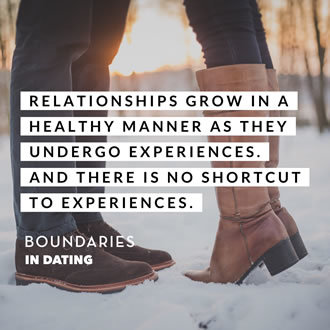 One of my (Dr. Townsend’s) closest friends, Chuck, is a talented songwriter. When we were college buddies, I was visiting him in his room one day. Chuck picked up his guitar and said, “Want to hear my new love song?” I said I did, and he sang me the following: “I love you. Always have, always will. What’s your name?”
One of my (Dr. Townsend’s) closest friends, Chuck, is a talented songwriter. When we were college buddies, I was visiting him in his room one day. Chuck picked up his guitar and said, “Want to hear my new love song?” I said I did, and he sang me the following: “I love you. Always have, always will. What’s your name?”
I never found out whether Chuck was referring to his dating history or simply observing college romantic life, but I knew I could identify with his lyrics. I understood the ritual of intense professions of undying love, followed by the realization of utter ignorance about one’s beloved. In other words, too much, too fast.
Relationships grow in a healthy manner only as they undergo experiences, and there is no shortcut to experiences. In other words, we only “know” each other to the extent that we have experience with each other. We can know facts about the person we are dating: their friends, job, hobbies, and so forth. But that doesn’t mean we “know” them as a person. That kind of “knowing” cannot come from reading a file on someone.
________
Click to Tweet: Relationships grow in a healthy manner only as they undergo experiences, and there is no shortcut to experiences.
________
Experience requires time. It is simply impossible to get enough experiences under your belt without spending a lot of time dealing with the relationship. Here are eight examples of must-have time-consuming activities on the road to becoming committed to someone:
Entering each other’s worlds of work, hobbies, worship, and service
Having enough talks to safely open up with each other
Meeting and spending time with each other’s friends
Understanding each other’s strengths and weaknesses
Going over basic values of what is important in life to each other
Getting to know each other’s families
Spending time away from each other to think through the relationship, alone and with friends
Learning your best style of disagreement and conflict management
It’s hard to imagine doing all that in a few months, because it can’t be done. Yet, so many dreamy-eyed couples will say to their friends, “You don’t understand. It’s as if we’ve known each other all our lives. We were soul mates from the first meeting.” And, while I know people who have met and married quickly, I think their success is due more to their own character than to going through the process the right way.
For example, my Aunt Jonnie and Uncle Walton have been married over fifty years. I have seen his framed proposal of marriage to her. He wrote it to her when they were both in kindergarten! I guess they both knew each other was “The One” pretty early on in life. But I don’t think they would attribute their successful marriage to how early they committed. Knowing and observing them all my life, I think they would instead talk about love, the right values, their faith, and being able to go through good times and bad together.
There is no microwave dating that makes any sense. Go through the seasons of life with the person you believe might be the one God has meant for you.
________
Get more helpful advice to build the best dating relationship and find the love of your life in Boundaries in Dating by Dr. John Townsend and Dr. Henry Cloud.
 Get The 10 Laws of Boundaries eBook when you subscribe to the Boundaries Weekly email newsletter. Learn More
Get The 10 Laws of Boundaries eBook when you subscribe to the Boundaries Weekly email newsletter. Learn More
The post 8 Must-Have Moments to Make Love Last appeared first on Boundaries Books.
November 19, 2018
Why Actions Speak Louder Than Words When It Comes to Love
 George sat in my (Dr. Cloud’s) office, despondent. His wife, Janet, whom he loved deeply, had just moved out because he had lost another job. A very talented person, George seemed to have everything he needed for success. But he had lost several good jobs because of his irresponsibility and inability to follow through. Bosses loved the talent but hated the performance. And after several family disruptions because of his failures, Janet had had enough.
George sat in my (Dr. Cloud’s) office, despondent. His wife, Janet, whom he loved deeply, had just moved out because he had lost another job. A very talented person, George seemed to have everything he needed for success. But he had lost several good jobs because of his irresponsibility and inability to follow through. Bosses loved the talent but hated the performance. And after several family disruptions because of his failures, Janet had had enough.
“I love her so much,” George said to me. “Doesn’t she see that?”
“I believe that you love her,” I said. “But in reality, I don’t think that she sees your love. All she sees is the effect your behavior has had on her and the children, and she asks herself, ‘How can he love us and treat us this way?’ You cannot just say you love someone and not deliver. Love without the fruits of love is really not love in the end. She feels very unloved because of what you have put her through.”
If George was to have a chance of winning Janet back, it would not come through one more empty promise. He needed to develop boundaries to gain the self-control that would make him a responsible person. Janet was only going to believe in action, not just talk about love.
________
Click to Tweet: You cannot just say you love someone and not deliver. Love without the fruits of love is really not love in the end.
________
George had never been required to deliver the fruits of love when growing up. His parents were fine, hardworking people. But having gone through the Depression and a lifetime of hard work, they did not want George to have to struggle as they had. As a result, they indulged him and required very little work from him. When they did give him chores and responsibilities and he did not deliver, they would not discipline him, thinking that they wanted him to have “positive self-esteem” rather than the “guilt” with which they grew up. Consequently, he did not see any negative effect on his loved ones when he did not perform.
But marriage was different. He was now in a relationship in which the one he loved also had requirements for him, and things were falling apart. For George to become a truly loving person, one whose love actually made a difference in the lives of others, he was going to have to become a responsible person. In the end, love is as love does.
Moreover, loving people respect the boundaries of others. Have you ever been in a relationship with a person who could not hear the word no? How did you feel? Typically one feels controlled, manipulated, and resentful instead of respected and loved. A controlling person steps over the line and tries to possess the other. This does not feel very loving, no matter how much the offender says he cares.
Loving people are able to control their impulses. Many alcoholics, for example, have great love for their families. Their drinking greatly troubles them, and they feel horrendous guilt. But still they drink, and although, like George, they love, the effects of their lack of ability to say no to alcohol ends up destroying the relationships they care about. Many other impulse problems—such as sexual acting out, overspending, food or drug abuse, and rage attacks—end up destroying love as well. A lack of boundaries keeps these behaviors going.
A loving person recognizes that the world does not revolve around him or her. They consider the consequences of their behavior on people around them before they act. In psychological terms, they are not “egocentric”—thinking that they are all that matters and that people around them exist only to meet their demands and needs.
George’s irresponsibility was costing him his marriage and had cost him financial losses, chaos, a lack of stability, and unrealized dreams. But what is this thing we call responsibility? Many things come to mind, such as duty or obligations, reliability and dependability, or just “getting the job done.”
Responsibility is actually broader than this. We think of responsibility in terms of ownership. To take ownership of your life is ultimately to take control. Ownership is to truly possess your life and to know that you are accountable for your life—to God and others. When you take ownership, you realize that all aspects of your life are truly yours and only yours, and that no one is going to live your life for you.
People who are accountable see life as something that has been entrusted to them, and they know that they and they only will be responsible for what they do with it. To take ownership of these is to be a truly responsible person, the kind of person with whom everyone wants to have a relationship. A responsible person says, “My feelings are my problem,” or “My attitude is my problem.” In addition, the truly responsible adult realizes, “I made me do it, and I am responsible.” With that, there is hope for self-control to develop.
________
Taken from Boundaries in Marriage by Dr. Henry Cloud and Dr. John Townsend. Learn more about this helpful book.
 Get The 10 Laws of Boundaries eBook when you subscribe to the Boundaries Weekly email newsletter. Learn More
Get The 10 Laws of Boundaries eBook when you subscribe to the Boundaries Weekly email newsletter. Learn More
The post Why Actions Speak Louder Than Words When It Comes to Love appeared first on Boundaries Books.
November 13, 2018
How Your Openness to Feedback Impacts Your Performance
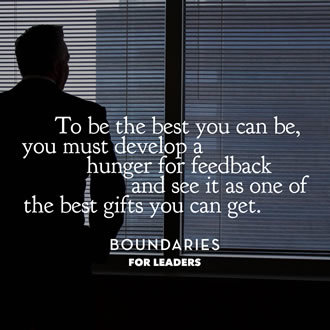 Business management expert Ken Blanchard says that feedback is the “breakfast of champions.” Indeed, learning how we are doing and how to do better are keys to great performance. In fact, the best performance situations are when we are getting the most immediate feedback, which is from the task itself, as flow researcher Mihaly Csikszentmihalyi has found.
Business management expert Ken Blanchard says that feedback is the “breakfast of champions.” Indeed, learning how we are doing and how to do better are keys to great performance. In fact, the best performance situations are when we are getting the most immediate feedback, which is from the task itself, as flow researcher Mihaly Csikszentmihalyi has found.
The problem tends to occur at the moment when we actually get the feedback, either from other people or from the outcomes themselves. That is when our leadership character shows itself. While Blanchard gets it exactly right about the kind of breakfast we need, truth is that not everyone has the same appetite for breakfast. Some people wake up and really want it, while it makes others sick to their stomachs. Some are allergic to feedback. They set boundaries against constructive criticism.
Brain research shows that feedback can do funny things to us if we see it as a danger or a put-down. We go into the “moving away” or “moving against” mode of fight-or-flight. The brain gets biochemically goofy. That is why you see people get so defensive and go to great lengths to fight any feedback. But remember, fight-or-flight only comes when there is a perceived danger. Therein is the rub. If we see feedback as dangerous, we will bristle and fight it. But if we perceive feedback as an unexpected windfall, like winning the lottery, we will seek it out and be open to it, and sometimes even pay for it. That is what good character does… it hungers for feedback.
To be the best you can be, you must develop a hunger for feedback and see it as one of the best gifts you can get. It is part of being an open system and has incredible value not only to you but also to your people.
I was conducting a leadership offsite where the executive team members responsible for the agenda had asked me to try to maneuver the conversation toward a topic they all wanted to discuss but didn’t want to state explicitly on the agenda. After a lot of discussion about why I had to “maneuver” it that way instead of just intentionally designing it that way, the team confessed that their real goal was to sneak some tough feedback about the CEO onto the agenda – but in a way that would not throw him off or make him defensive. They feared that if the agenda were openly designed to give him feedback, it would never work. They hoped I would be able to “go there if the mood was right.” How sneaky, a lot of pressure, and not a lot of hope for success, I thought. I told them I understood their concerns but that I had a different plan to get the CEO into the right zone.
So at the beginning of the meeting, I explained the “physics of leadership” and the importance of the Second Law of Thermodynamics, mentioned above. I explained why it is important for senior leaders to be an open system and model receiving feedback well in organizations, and I emphasized that being open to feedback is a key indicator not only of leadership aptitude but also character. Good character welcomes feedback and foolish character fights it off.
I don’t know whether it was these comments of the mood – or whether the team had just misread the CEO – but when the time came for “saying things that are hard to say, but necessary for the good vision,” one of the members of the executive team had the courage to wade in. He told the CEO that there were some things that they needed from him that they were not getting, and that there were some things in his leadership style that was leaving the team and the organization with some gaps in performance. I watched and held my breath, waiting for the whole retreat to blow up before my eyes. (I love these moments, though. They can be some of the most powerful.)
The CEO listened as this tough feedback came at him in front of his whole team. And he did what the great leaders do: He received it, and he thanked them for it.
They looked stunned. But what was amazing was the discussion that followed. The CEO talking about his own passions, and the strengths and weaknesses that made him lead that way. His candor broke the logjam, and the team was able to come together and offer ways to help the CEO deal with his challenges. What made it happen was the CEO’s receptivity to hearing what his stakeholders had to say – his willingness to embrace it and make changes. And part of what made him receptive was hearing from me, an outsider, that it was more than ok – it was normal and even desirable – to hear and receive feedback. Now, four year later, the team still refers to that moment as “the retreat where we got honest.” It was the beginning of a shift in the entire culture, ignited by the CEO’s openness to feedback.
What is your appetite for feedback? Do you get defensive or receptive?
________
Overcome your fear of feedback and learn why some people get results when others don’t. Get the must-read leadership book for individuals and organizations by Dr. Henry Cloud, Boundaries for Leaders.
The post How Your Openness to Feedback Impacts Your Performance appeared first on Boundaries Books.
November 9, 2018
How to Test the Quality of Any Relationship
 Usually the quiet one in her group, Debbie spoke up. The topic of discussion was “conflict resolution,” and she couldn’t be silent another second. “I know how to present facts and arguments about my opinion in a caring way. But my husband will walk out on me if I start disagreeing! Now what do I do?”
Usually the quiet one in her group, Debbie spoke up. The topic of discussion was “conflict resolution,” and she couldn’t be silent another second. “I know how to present facts and arguments about my opinion in a caring way. But my husband will walk out on me if I start disagreeing! Now what do I do?”
Debbie’s problem is shared by many. She genuinely believes in boundaries, but she is terrified of their consequences.
Is it possible that others will become angry at our boundaries and attack or withdraw from us? Absolutely. God never gave us the power or the right to control how others respond to our “no.” Some will welcome it; some will hate it.
We can’t manipulate people into swallowing our boundaries by sugarcoating them. Boundaries are a “litmus test” for the quality of our relationships. Those people in our lives who can respect our boundaries will love our wills, our opinions, our separateness. Those who can’t respect our boundaries are telling us that they don’t love our “no.” They only love our “yes,” our compliance.
So what does Debbie, whose husband is an avowed “boundary buster,” do? Will her husband carry out his threat to walk out on her? She can’t control his response. But if the only thing keeping Debbie’s husband home is her total compliance, is this a marriage at all? And how will problems ever be addressed when she and he avoid them?
Setting limits has to do with telling the truth. First, there is the person who welcomes your boundaries. Who accepts them. Who listens to them. Who says, “I’m glad you have a separate opinion. It makes me a better person.” This person is called wise.
________
Click to Tweet: God never gave us the power or the right to control how others respond to our “no.” Some will welcome it; some will hate it.
________
The second type hates limits. Resents your difference. Tries to manipulate you into giving up your treasures. Try our “litmus test” experiment with your significant relationships. Tell them “no” in some area. You’ll either come out with increased intimacy — or learn that there was very little to begin with.
Do Debbie’s boundaries with her husband condemn her to a life of isolation? Absolutely not. If telling the truth causes someone to leave you, this gives the church an opportunity to provide support and a spiritual and emotional “home” to the abandoned person.
In no way are we advocating divorce. The point is that you can’t make anyone stay with or love you. Ultimately that is up to your partner. Sometimes setting boundaries clarifies that you were left a long time ago, in every way, perhaps, except physically. Often, when a crisis like this occurs, it helps the struggling couple reconcile and remake their marriage into a more biblical one. The problem was raised, and now can be addressed.
Warning: the boundaryless spouse who develops limits begins changing in the marriage. There are more disagreements. There are more conflicts over values, schedules, money, kids, and sex. Quite often, however, the limits help the out-of-control spouse begin to experience the necessary pain that can motivate him or her to take more responsibility in the marriage. Many marriages are strengthened after boundaries are set because the spouse begins to miss the relationship.
Will some people abandon or attack us for having boundaries? Yes. But, it’s better to learn about their character and take steps to fix the problem than never to know in the first place.
________
With over 2 million copies sold, The New York Times bestseller Boundaries is the best resource for learning how to set limits and make wise decisions in any relationship. Learn more.
 Get The 10 Laws of Boundaries eBook when you subscribe to the Boundaries Weekly email newsletter. Learn More
Get The 10 Laws of Boundaries eBook when you subscribe to the Boundaries Weekly email newsletter. Learn More
The post How to Test the Quality of Any Relationship appeared first on Boundaries Books.
November 5, 2018
Four Reasons Why You Need to Respect the Future
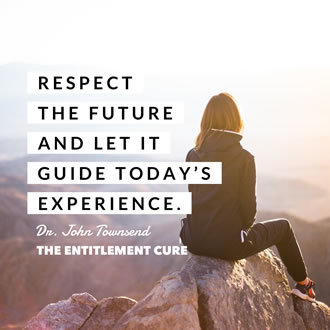 No one would argue with the importance of living in the present. God designed creation so that we live and breathe in the present. When we lose current experience, we are only half alive. But here is the problem, and it’s a huge one: Focusing only on the present is just as dysfunctional as focusing only on the future.
No one would argue with the importance of living in the present. God designed creation so that we live and breathe in the present. When we lose current experience, we are only half alive. But here is the problem, and it’s a huge one: Focusing only on the present is just as dysfunctional as focusing only on the future.
The entitlement mantra about the future is: Ignore the future and focus on today. But the Hard Way mantra is: Respect the future and let it guide today’s experience. And why should we respect the future? Here are four reasons:
One Day You Will Experience Your Future
Your future is not “out there.” Very soon, it won’t be called the future; it will be called Now. And you’ll experience it, feel it, touch it, and taste it, for better or worse.
The future certainly will arrive — and as much as possible, we want to think about the things that we will experience before they overtake us.
Think of it this way. Small children don’t have the skills to truly understand the impact of the future. Their neurology and emotions are all about today and now. One of the roles of a good parent is to get children to consider the future. “If you bonk your little brother on the head, you’ll be sitting in a time-out chair in the kitchen.” The pleasure of dominating a sibling feels less inviting when a future of no freedom seems likely. This is why parents need to follow up on their promises about consequences for certain behavior. If your promises amount to empty threats, maybe because you feel tired, your child will learn that the future is not to be respected. All I have to do, he thinks, is get used to a nagging parent. But a competent parent imposes the consequence consistently so that the child actually experiences the future consequence as a present-day reality, and therefore respects it.
Adults too need to respect the future. We aren’t bulletproof, any more than children are. In business, CEOs sign contracts in the present and need to honor them in the future even if circumstances change. If you are a young adult, your toned body will become more difficult to maintain as you age. As Rick Warren says, “I used to have a six pack, but then it turned into a keg.”
Bill Hybels says that “we tend not to drift into better behaviors.” He means that over time, our energy, our bodies, and our focus lose steam. That’s just the nature of things. If you are over the age of thirty-five, look in the mirror after you shower. This truth will be evident. Because we do not tend to drift into better behaviors, we must constantly put resources northward to help combat this southward erosion of life. The older you get, the more time and effort you must devote to moving against the flow. Tomorrow is coming like a train, and you will experience either what it is like to jump on board and have a great ride or what it feels like to be left standing on the tracks with nowhere to go.
A Groundhog Day Life Doesn’t Work
Let’s look a little deeper into your present, the life you live today. You may be struggling with major difficulties. Or you may be in the okay range, where things aren’t ideal but they’re good enough. Or you may be enjoying a fantastic life.
No one wants a life of major struggle to continue forever. That would feel miserable and hopeless. And few people are content with just “okay” forever. That’s just a halfway satisfying life; sooner or later, those with such a life wake up and think, I settled. And I paid a big price for it.
I don’t even know anyone with a fantastic life who wants everything to stay the way it is forever. Even people with a great life still want growth, improvement, and change. And the most self-satisfied and complacent among us — such as the Pharisee in one of Jesus’ parables, the man who said, “God, I thank you that I am not like other people” (Luke 18:11) — aren’t seen in a positive light.
A life that does not change and improve is like the movie Groundhog Day, in which Bill Murray’s character repeats his life over and over again until he becomes completely miserable. Even his successes become meaningless.
And that’s why you must respect, consider, and act on your future. Because if you don’t, your best possible case is Groundhog Day, where you, your relationships, your career, and your life stay stuck in a repetitive pattern. Same thoughts, habits, patterns, struggles, and activities. When you don’t think in the present about the future, you get trapped in an endless loop.
My kids have friends who didn’t leave for college after high school, though they could have. Nor did they find something meaningful to do in town. The result is that they have become objects of pity to their friends. Often they continue to hang out with much younger high school kids, reliving their “glory days,” because that’s where they got stuck emotionally.
Some of my own friends live in Groundhog Day. They don’t spend energy on the future, such as where they will vacation next year or where they hope their kids will go to college. I find it hard to spend a great deal of time with them, because I see so much potential for them to develop their talents, find more passion, take risks, and experience transformational lives. Instead, I feel sadness, discouragement, and frustration for them.
Some of these friends have escaped the loop by starting to hang around people who draw their attention to the importance of their future (perhaps men and women in a great church or from a small group or a movement). And some have broken out of that wasteful pattern because they encountered great loss, such as a child on drugs or a divorce. But too many of them continue to play Bill Murray.
While Your Past Is a Closed Door, Your Future Is an Open One
Respect the future because it is not over and done, as is your past. It is yet to be decided, and there are so many possibilities. On the one hand, you can’t undo the past. You can’t change your mistakes, wins, and losses. That door is closed. On the other hand, you can learn from your past, and it can be redeemed in your growth and healing. But there is no “do over.”
Not so with the future.
I’m a big believer in blue-sky thinking. With my business clients, I do a lot of “let’s start with the ideal” brainstorming about the company, its potential, and what might be possible. I’ll set up a whiteboard and say, “It’s a blank slate; fill in your future.” Inevitably, creative, innovative, exciting ideas fill up the space. We are built to think about and get energy from the hope that comes from a bright future.
When this catalytic energy occurs, regardless of whether we’re talking about your company or your personal life, it’s bound to change your present behavior. You will be more strategic about how you spend your time, money, and energy. You will be more disciplined in how you choose your relationships. You will be driven and fueled by a hope for a much better future. When you respect the future, you dramatically increase your chances of attaining a better one.
The Magic of Compounding Today Creates a Great Future
Financial managers use the term “the magic of compounding” to describe a great benefit that accrues when you respect the future. When people save and invest well early in life, the money saved and earned increases at a high rate over time. When people begin to save later in life, they can’t take as much advantage of the magic of compounding. Time is on your side when you save from an early age.
The magic of compounding is one variety of the concept of sowing and reaping. The better and earlier you invest your time, talents, and treasures, the better the rest of your life will be. Healthy marriages, families, careers, spiritual lives, and bodies are all the result of reaping from earlier “sowing.” Early is always better.
A friend of mine who reviewed the manuscript for my book The Entitlement Cure told me about a client of hers whose motto was “one day at a time.” This client wanted to be free of anxiety and dread over the future and wanted to keep her life simple. So she never saved, never watched her diet, and didn’t study up on how to create and maintain great relationships. She literally lived one day at a time. Now in her later years, she is having great difficulty. Retirement will be a problem for her. She has diabetes from her poor eating habits and chaotic lifestyle. And she enjoys no stable relationships.
“One day at a time” is actually a helpful statement when used in context. I use it when I work with people in Alcoholics Anonymous who feel overwhelmed by their many life struggles. But you must balance “one day at a time” with being respectful of the future and guiding your daily decisions by how they will impact you tomorrow.
When we pay attention to all three time periods (past, present, and future), life goes well for us. The lessons of the past and an anticipation of the future guide our present’s direction and tell us where we should put our energy and effort.
________
Adapted from The Entitlement Cure by Dr. John Townsend. Now in softcover! Learn more about this ground-breaking book.
The post Four Reasons Why You Need to Respect the Future appeared first on Boundaries Books.



